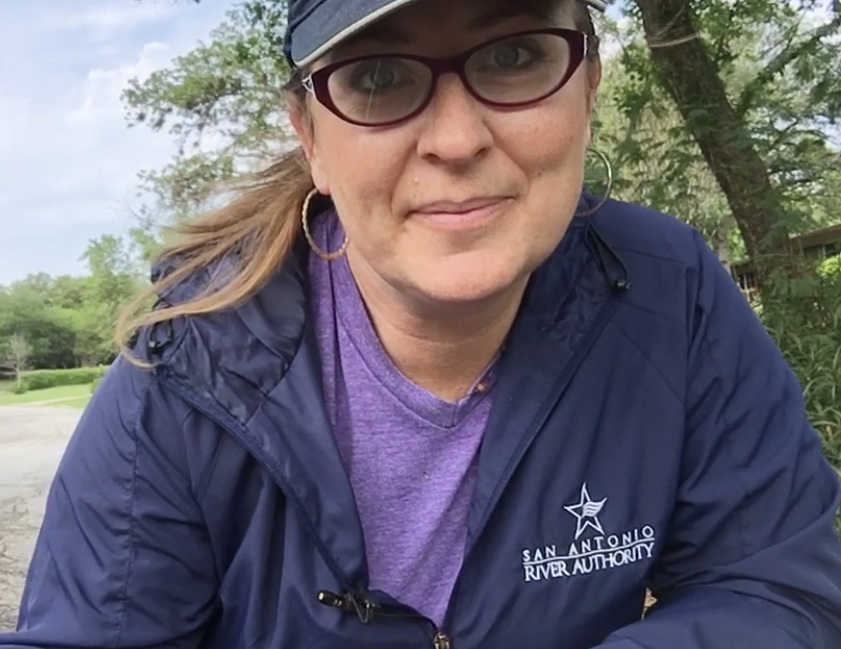Carrie Merson is the Education and Engagement Specialist at the San Antonio River Authority. She has had one foot in the education field and one foot in the wildlife sciences field for over 20 years. Her role at the San Antonio River Authority for provides the ideal setting to combine those paths into Environmental Education programs. She enjoys camping and hiking and finds rivers particularly special to her life. Carrie is passionate about providing nature-based experiences for any age and feels it is critical for a sustainable future. Below, Carrie shares with the Urban Waters Learning Network how she has adapted her work and is keeping up with her passion for teaching during this time of social distancing.
The San Antonio River Authority issued the work-from-home protocol March 18. The Education and Engagement Team quickly embraced our new, and sudden, approach to environmental and river education. We set out to answer the questions: how do we continue to do impactful work and do it digitally?
Dare I say, sometimes I think I was asking the team the scarier question which is “how do we, as informal, environmental educators, stay relevant?”
Before the pandemic, we were a team of 4 that was solid in our place-based and nature-based programming. The demand for our field trips brought us a growing waitlist, while we served approximately 8,000 students, teachers, and families annually. Evidence indicated the benefits of what we provided allowed students and the San Antonio River to dance in a win-win dynamic. Certainly, a career highlight was for the team to see, in person and in real-time, students grow in the understanding of their connection to the watershed, and we gleamed as the students tasked themselves to be stewards into the future.
It was always great to see the students, and not to mention the laughter, the sunshine, the singing mockingbirds, the peace of the river riffle, the residential osprey, kids running with joy through the park, the bright Texas flowers, the equally bright butterflies, and the team’s smiles were all reasons to go to work every day. I know nearly every environmental educator out there, across the globe, must have felt the same way before many of us turned 90 degrees from that bright normal into creating online content, inside.
Increasing online presence was not in my education team’s wheelhouse on an agency level. We planned, brainstormed, planned, brainstormed, and planned some more. It was clear that we would need to engage our Community Relations Department to make anything happen for family kitchen table education programs. In fact, building a close relationship with that team was not only critical but necessary to our efforts. On April 1, the combined team launched our online series RIVER CAMP! Virtual Education Series that is featured on social media every Wednesday and Friday and supported with online resources.
The concept was created to address two points. The first was to display empathy for our collective situation with COVID-19. The second was the provide relevant and tangible ways for children and their parents to engage with nature and the stewardship of their watershed from their homes and neighborhoods. Our home setups involved using Microsoft Teams daily. The team agreed that we wanted to “see” everyone via the computer video camera when we met. Staying connected on as many human levels still available to us was important.
Because our new program involved video work in our homes, and produced entirely within our smartphones, we had to set up presentation spaces, improve indoor lighting, find nice backgrounds and outside neighborhood areas that didn’t give too much away. We buried ourselves in old lessons and activities to revitalize and post.
Content and video production is now a time of story boards, selfie sticks, tripods that are not tripods, but rather books, cups, and boxes stacked on top of each other, dogs barking at the wrong time while you are trying to record your program, partners coming through knocking over the homemade “tripod” while you are trying to record your program, and of course, the inexplicable inability to get through your script without the words becoming an unrecognizable tongue-tied language. I was happy for my meditation practices when I noticed a large error in one of my video clips, after “finalizing” my video. Finally, as we finished our first of many online lessons, the satisfaction of “that’s a wrap” set in.
The hopeful outcome of the launch fills the new void with thoughts of “Will they like it? Will they use it? Will it inspire them? Did we do our job well?” We can’t see the 8,000 faces that would let us know, like we were able to see before.
Who knows where the resulting program data and the pandemic will take us, next. We will continue to take the journey alongside many other educators out there with our arms wide and with a standing invitation to connect anytime.
See the launch of San Antonio River Authority’s RIVER CAMP! Virtual Education Series: https://www.sara-tx.org/education/river-camp-virtual-education-series. We plan to stay in contact with Carrie to hear more about the results of the program. You can also reach out to Carrie at cmerson@sara-tx.org.
Find more resources, programs and ideas from other members of the Urban Waters Learning Network here: https://urbanwaterslearningnetwork.org/uwln-resources-physically-distant-community-engagement-apr-2020/.


